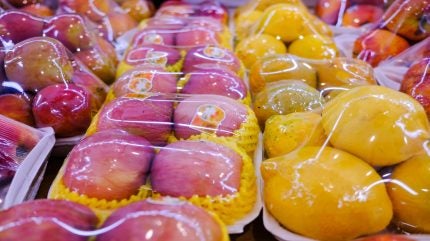
Researchers at Chungnam National University in South Korea developed a new edible biofilm, which is claimed to extend the shelf life of fruits, PerishableNews has reported.
The biofilm, made from a chitosan (CS) and gallic acid (GA) conjugate, is said to be a sustainable alternative to traditional fruit packaging, combining mechanical strength with solubility to help maintain freshness.
Chitosan, derived from the endoskeleton of crustaceans, is a natural polymer that is nontoxic, biodegradable, and has excellent film-forming capabilities.
However, its use in food coating has been limited up until now due to its weak barrier and poor antimicrobial properties.
To overcome these challenges, a team led by Professor Won Ho Park at the university incorporated GA, a polyphenolic compound, into CS to create a CS-GA conjugate film.
The study conducted by the team focused on the synthesis and characterisation of the film.
They compared the new film’s properties to those of CS films to evaluate the enhancements provided by GA.
The team tested the film’s performance on mini bananas and cherry tomatoes, noting significant improvements in mechanical strength, which could protect the fruits from damage during transportation.
The CS-GA film is said to have also demonstrated superior antioxidant properties, which contributed to an extended shelf life for the fruits.
Additionally, the film showed improved antibacterial activity against two types of bacteria, indicating its potential to combat multiple microbial species.
The film’s UV-blocking capabilities were also noted, which could prevent photo discolouration and damage to the fruits.
This advancement in green technology aligns with global efforts to reduce food waste, supporting the UN’s Sustainability Development Goals aimed at halving food waste by 2030.
Ho Park was quoted by PerishableNews as saying: “We wanted to develop a CS-based biofilm with enhanced food coating properties, and we were hopeful that the incorporation of GA might help in achieving that.
“Many consumers are concerned about remaining coating residues on the fruits. The washability of this conjugate makes it appealing for these consumers.
“Also, we observed a significant reduction in dehydration, discolouration, and mass loss of the stored fruits when the coating was applied. This indicates shelf life extension and freshness retention.”




